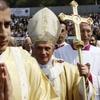Pope visits Israel, seeking closer ties
Hurriyet Daily News with wires

refid:11620679 ilişkili resim dosyası
In a wall of the tiny museum at Rome's majestic central synagogue hangs a copy of the 1555 edict of Pope Paul IV that confined the Jews to the ghetto, branding them as killers of Christ. The display stands as a permanent reminder of the tortured two-millennia history of Jewish-Catholic relations - an estrangement that only in the past 50 years has begun to heal.Today, the pope is set to begin a historic visit to Israel and stop at Judaism's holiest place, the Western Wall, and pay his respects at the Yad Vashem Holocaust memorial. Benedict XVI is the third pope to visit the Holy Land, but he carries an especially heavy load of historical and psychological baggage.
The steady progress in Jewish-Catholic relations is marred by continuing controversy over whether the Vatican did enough to save Jews from Hitler. Benedict himself is German, and like many youngsters of the time, served in the Hitler Youth movement. He stirred uproar by his recent reconciliation with a rebel bishop who turned out to be a Holocaust denier.
Overcoming disputes
Still, that the 82-year-old pope is making the trip at all is a testament to the ability of Catholics and Jews to overcome the recent disputes.
"My primary intention is to visit the places made holy by the life of Jesus, and, to pray at them for the gift of peace and unity for your families, and all those for whom the Holy Land and the Middle East is home," The Associated Press quoted Benedict’s message as saying last week.
Benedict has already had to tread carefully during the first leg of his Holy Land trip to predominantly Muslim Jordan. Three years ago, the pope angered many in the Muslim world when he quoted a medieval text that characterized some of Islam's Prophet Muhammad's teachings as "evil and inhuman."
After arriving on Friday, Benedict said he has "deep respect" for Islam. On the first open-air Mass of his Holy Land pilgrimage, he urged Christians yesterday to hold on to their faith and hailed their courage in a region that long devastated by conflict that has forced many to flee. "The Catholic community here is deeply touched by the difficulties and uncertainties which affect all the people of the Middle East," he said, reported Agence France-Presse. He also called for more respect for women, saying society owed them for their courageous efforts to build peace.
Benedict is expected to arrive Israel today, and his visit there highlights how much has changed in the 45 years since Pope Paul VI became the first pontiff to visit Israel. Palestinian activists have said they hope to use the visit to draw attention to their claims against Israel, including demolitions of Palestinian homes and construction of Jewish neighborhoods in east Jerusalem.
The Israel leg of Paul's pilgrimage was called unofficial, and during the 11-hour stop he never publicly mentioned Israel by name. The Vatican had no diplomatic ties with Israel. For their part, Catholic leaders were upset over the more than 1,300 Palestinians killed during Israel's Gaza offensive, while Israel took offense when a Vatican cardinal likened Gaza to a "big concentration camp." Still in debate is the allegation that Pius XII failed to speak out forcefully against Hitler's Final Solution. Benedict has referred to Pius as a great churchman. Many Jews are outraged at a 25-year-long effort to declare Pius a saint, and when Benedict visits Yad Vashem, he will skip the museum that displays a picture of Pius with a caption saying he did not protest the genocide and kept largely "neutral."
















